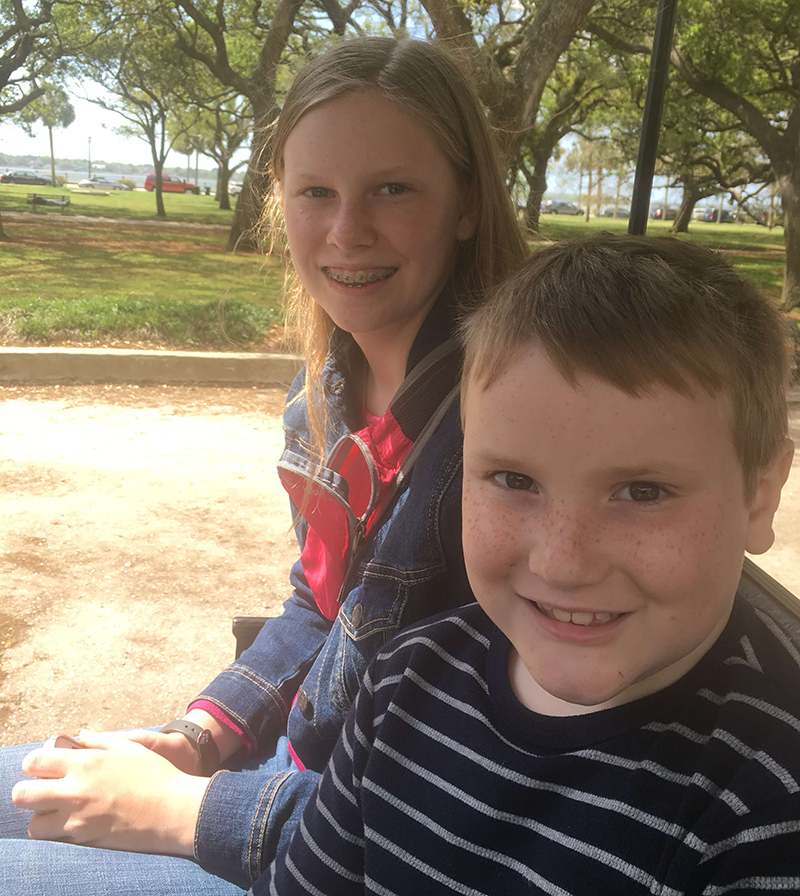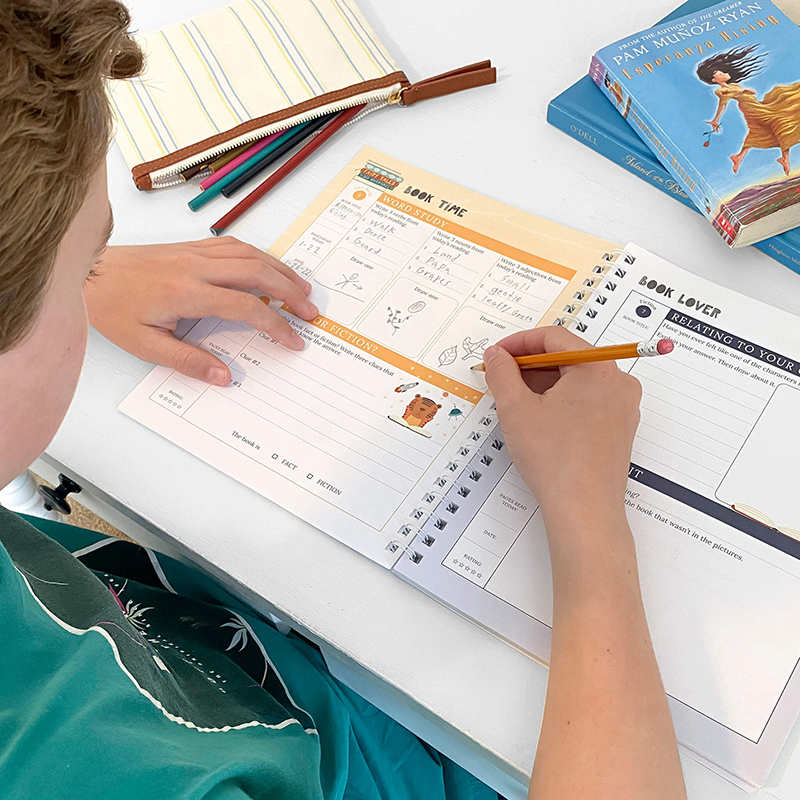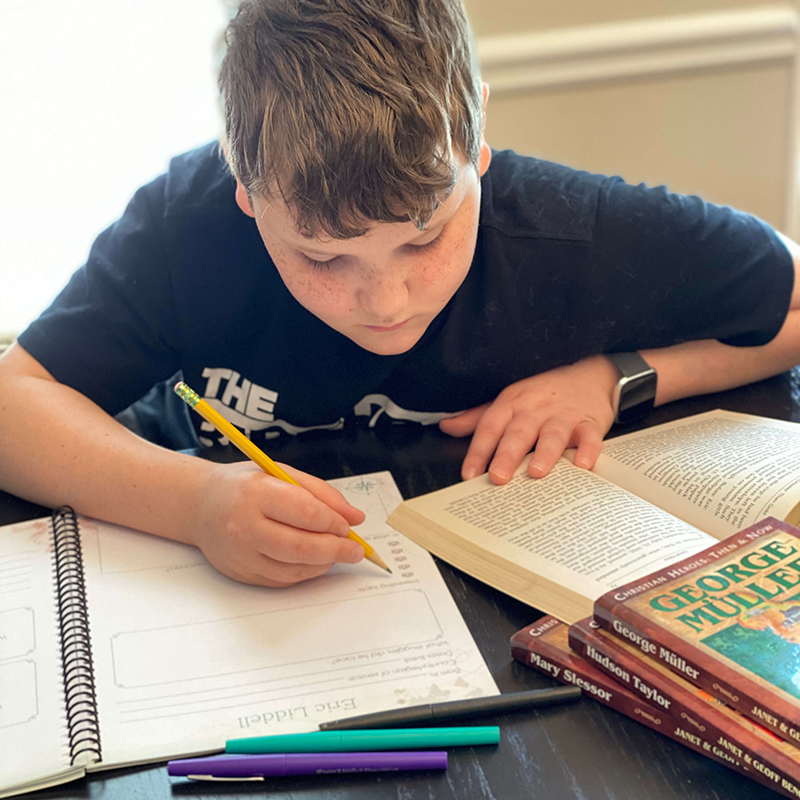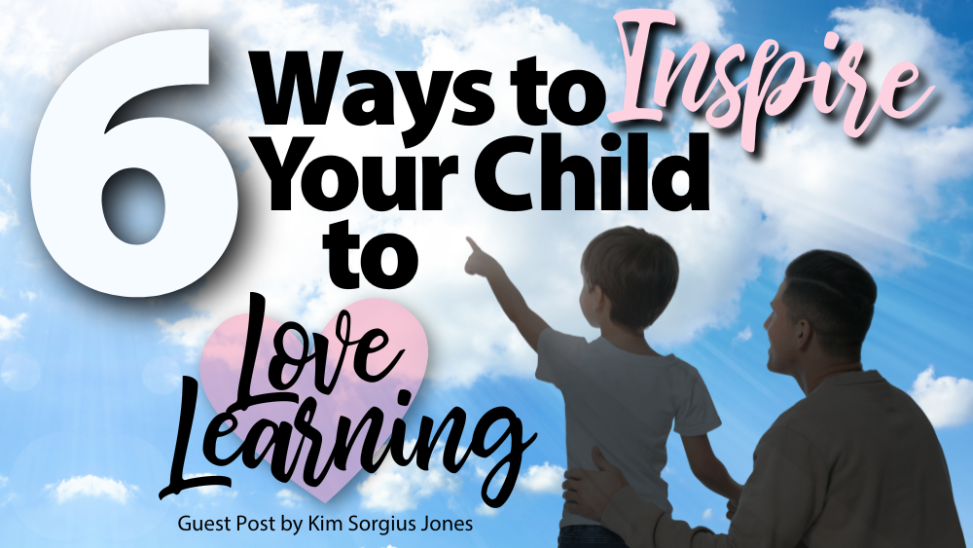Inspiring your child to love learning is likely one of your top homeschooling goals.
Our 2024 Homeschool Iowa Conference keynote speaker,
Kim Sorgius Jones of Not Consumed,
offers six ways you can inspire a love of learning in your kids.
It’s funny how God uses moments in our lives to teach us.
One week, my kids and I had planned to go to Charleston, South Carolina, to speak to a homeschool group. I typically look for ways to tie in our trip with something fun and interesting to see so it’s not all work and no play. This trip was no exception, promising a historic carriage ride through the city and an afternoon in a real battle fort (you know, for the boys and all).
I’ll be honest. The carriage ride was an hour-long tour around the city, where we mostly saw houses, while a lady stood up in front of us and shared specific facts about Charleston’s involvement in the Civil War. Now, I consider myself kind of geeky in the learning space, so I loved every single minute of the tour. My kids, however, sat silent and didn’t say a single word. I had to wonder if they were bored to death, but they were, thankfully, too polite to show it.
Inspire your child to love learning by offering variety.

Kim's kids on the historic carriage ride.
After the tour, we walked through the Charleston City Market and found a place to grab lunch. Once the orders were taken and everything was settled, I pondered asking them about the carriage ride. I didn’t have to ponder long, as someone spontaneously offered up her thoughts.
“That carriage ride was the coolest thing ever!" she began.
The rest of them chimed in with facts and details that even I hadn’t even caught during our morning adventure.
The whole lunch conversation was filled with discussions of presidents, speculation about secession from the Union, the impact of slavery, and lots of talk about the leeches that likely contributed to the death of George Washington.
Although the kids at this table were 7, 10, 13, and 14, I doubt a high school-level history class could have rivaled our discussion. The kids were filled with the energy and excitement of actually seeing how the history of their country unfolded.

Kim's kids at the historic site in Charleston.
That evening, as I drove home, I saw the beauty of God’s lesson to me and His reminder of what real education looks like.
Learning is authentic.
It’s FUN!
It’s what you do
when you are interested
in knowing about something
that has an impact on your life.
If I had given my children a textbook on Civil War history, I’d be lucky if they remembered three facts from hours of “lessons.” But driving down the street and looking for the places where cannonballs were shot into the church steeples, houses burned down, and real people lived created a hunger for knowledge no book could compete with.
Now, I’m not suggesting that the only way to learn something is to go in person and experience it for yourself. What I am suggesting is that we have to bring back the interest in education. We have to find ways to weave everyday life into the things we are learning so our children are actually interested in knowing them.
Life, God’s creation, the story of our universe… all these things are fascinating. They are things we want to know more about until they are pushed, forced, or overcrowded must-dos on our list. Then they become boring chores to be endured.
How do you keep
the love of learning
alive in your kids?
Let me show you.

Learning Is a Lifestyle
One of the biggest mistakes we make in education today is limiting learning to sitting at a desk with a schoolbook. Because of that, we tend to think that if our kids only spend 2-3 hours a day doing “school,” then they have only devoted 2-3 hours that day to learning.
This is not true! Kids and adults alike are learning things in every moment of every day. When you cook dinner and forget to salt the potatoes, you learn a valuable lesson on the importance of something as small as salt. When your kids are making a tower out of blocks, they are learning the physics that allows the tower to be stable instead of falling over.
Learning is something that permeates everything we do from the moment we wake up until the moment we sleep. It describes everything from the proper technique for brushing your teeth to the science explaining why the water always flows down.
It’s time we redefine “school”
and ascribe to the idea of
a lifestyle of learning.

A Lifestyle of Learning Teaches
HOW to Learn,
Not WHAT to Learn
When my oldest child, who had been homeschooled her entire life, went to college, she had no trouble keeping up. Believe it or not, they don’t make you recite the periodic table of elements in college unless you’re a science major. Success in college is not dependent on whether or not you know things beforehand. Yes, you need to know how to read and write, but you don’t need to be able to name every president in order. In college, professors give students the information they need to know and ask them to learn it. So the key to being successful in college is not what you know; it’s knowing HOW to learn.
During the elementary years (yes, all the way until 7th grade), your primary focus for your child should be developing strong reading skills and mastering math facts. If you can conquer those two massive tasks, the rest should be all interest driven. Don’t drown your kids with a bunch of textbooks on subjects they don’t want to study, full of facts they refuse to remember. A great foundation in math and literacy will be the only tools they need to succeed in other subjects as they get older.
This doesn’t mean you won’t learn science, social studies, geography, history, Bible, and so much more. You will! Just do it naturally, as interest guides your family. When you go to the aquarium or beach, study the ocean. If a new Italian restaurant opens in your town, study the culture, food, and geographical features of Italy. Just be sure you keep your focus on the basics in the process.

A Lifestyle of Learning
Supports Student-Led Interests
Let your kids make choices about what they are interested in learning. Not everyone is gifted the same way, and God never intended for every human to excel in the same things. We would be missing a lot of wonderful strengths if everyone were a math scholar, an inventor, or a Pulitzer Prize winner. Don’t box your kids in like that!
I strongly recommend a weekly trip to the library. From an early age, my daughter would choose horse books every single time we went to the library. To date, she has probably read no less than 1,000 horse novels and many more picture books. She could tell you anything and everything you would ever want to know about a horse. (Trust me, there is a lot more to know than you think.) There are also other benefits to this. Because I let her read about her passion and didn’t force her to read about snakes or sea turtles, she was almost never found without a book in hand.
As a result, she has a huge vocabulary (which served her well on the ACT exam), and she is an amazing writer. Now she applies the information she learned as a child to taking care of her own horses and teaching her students how to ride and care for horses. Much of this came simply from the fact that I let her read and enjoy it without limiting her by subject or even quality of literature.
I can’t stress this enough.
Be free with your kids
and let them explore the subjects
they want to know more about.
Make it easy for them. Help them get the resources to do it. Their natural desire to learn will nurture academic growth more than anything else ever could.
Reading missionary biographies can inspire your child to love learning.

Reading journals can inspire your child to love learning.
One way we do this is by keeping a reading journal instead of having a formal reading curriculum. As soon as my kids are strong readers (usually about 2nd grade), I let them move out of a reading curriculum and into the reading journal where they can decide what they will read. Each day, they complete 10-15 minutes’ worth of higher-level thinking prompts about what they read, and then they can spend the rest of the time enjoying it.

A Lifestyle of Learning
Means Everyone Is a Learner
This includes you, Mom (and Dad!). Let your kids see you reading about things you’re interested in. It’s totally okay to read fiction just because you like it! I recently read through a number of my favorite books from when I was a kid, and it was both enjoyable and inspirational to me as I thought about how much my life has changed since I first read them.
What is it that you’re curious about? What have you always wanted to try? Learn about it and try it!
When your kids see you interested in new things and maybe even get to jump in on the process, they will realize that learning is not just something kids do. Learning is a lifelong lifestyle!

A Lifestyle of Learning
Is Filled with Things that Matter
Yes, history is important. However, it’s much more important for your kids to know the foundations of their country and the history of Christianity than it is for them to know the details of every battle fought in China in the 1700s. Find the things that are important to your family and focus your educational pursuits on those.
Reading missionary biographies can inspire your child to love learning.

Reading missionary biographies can inspire your child to love learning.
One of the ways our family has done that is by studying missionaries. Learning about missionaries teaches many valuable things about history, cultures, and geography, but with a strong overall purpose. Missionaries inspire your kids to live for God and remind them of the great things God is capable of doing. When you focus on learning what really matters, your kids will know the information that will equip them to live the life God has called them to live instead of the life the world wants them to live.

A Lifestyle of Learning
Invites Questions
The 1st-6th grade children’s program at our church is so different from every other church I have been to. The teachers begin by asking the kids what they did that week, giving them a chance to talk and be heard. Once the lesson starts, the kids aren’t required to sit quietly and listen, but instead, they are given the opportunity to process what they hear by reacting with one another and asking any questions they might have mid-lesson. Sometimes the question may not tie directly into the lesson, but it shows that the child has been thinking.
One week, during a lesson on dragons and dinosaurs in the Bible, an inquisitive girl raised her hand and asked, “If Jesus is the Lion of Judah, but Satan is also called a lion, does that mean that lions are good or bad?” The teacher took the time to answer her question and, in the process, likely had to think about lions from a different perspective! Kids think about things in ways that adults don’t, and letting them ask questions inspires that curiosity and deeper level of thought.
So the next time your child asks, “Why?” for the 57th time,
take the opportunity to answer the question.
Questions are how we learn!

Kim Sorgius Jones
Kim Sorgius Jones is passionate about helping families grow in faith so they are "Not Consumed" by life.
Her practical, transparent, and heartfelt sessions will inspire and equip you to homeschool without feeling overwhelmed by circumstances.
She has had the privilege of homeschooling her four children and loves walking alongside other families on this journey. With her M.Ed. in Early Childhood and Curriculum Development, she creates high-quality products helping families live #NotConsumed.
Learn more about Kim and Not Consumed at notconsumed.com.
MORE FROM OUR WEBSITE:




